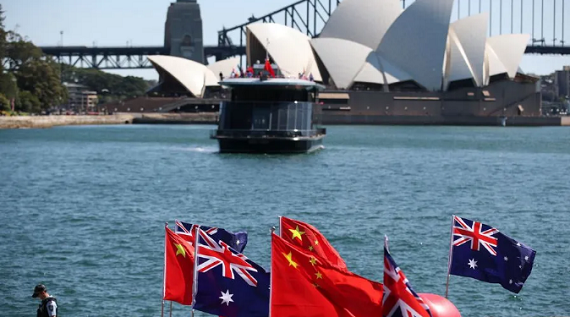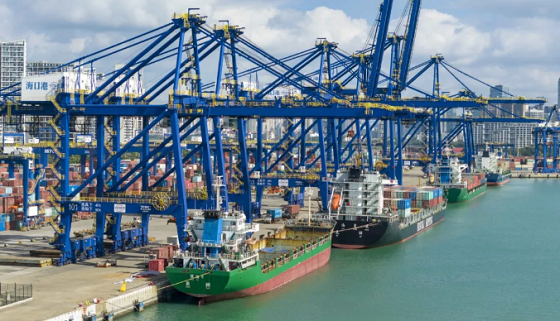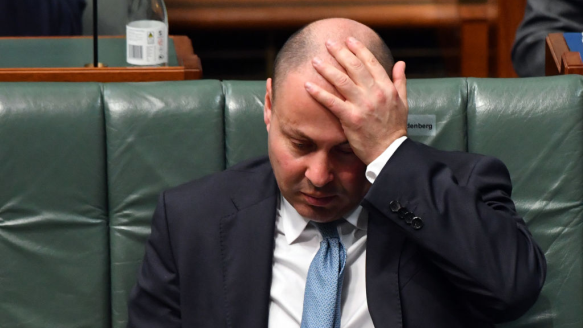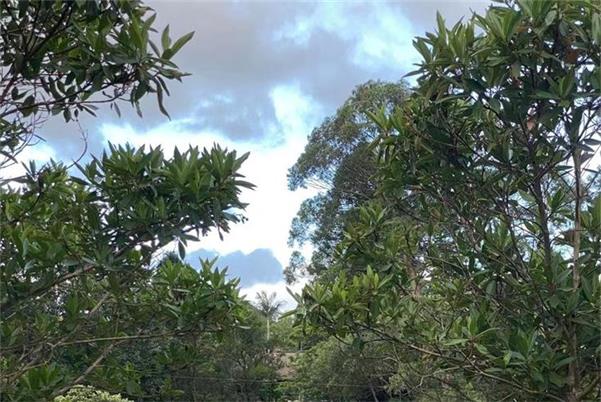Why Australian Government Scraps the BRI Cooperation?

The Australian Government may have rejected BRI, but smart Australian businesses know that this is where the future lies.
The Australian Federal Government recently vetoed two Belt and Road Memorandums of Understanding signed between the state of Victoria and China’s National Development and Reform Commission.
Foreign Affairs Minister Payne said the arrangements were considered to be “inconsistent with Australia’s foreign policy or adverse to Australia’s foreign relations.”
Newly appointed Defence Minister Dutton thundered that “China and others need to understand that Australia is not going to be bullied and we’re standing up for our beliefs.”
The reactions all seem a bit over the top when the BRI agreement did not commit the Victoria government to specific projects and were not legally binding. The agreements were about potential future co-operation.
Many Australian businesses quietly wondered just how much more debilitating aggravation would be unleashed by a Government that seems intent on frustrating cooperation with China.
The decision was not a surprise. In December 2020 the government introduced the Foreign Arrangements Scheme. It was clear the legislation was primarily aimed at the Belt and Road MOUs signed by the state of Victoria. The federal Government has a deep dislike for the Premier of Victoria, Daniel Andrews so the attack is part of a domestic political quarrel.
Although there are impacts on the Australia-China relationship, the driving factor behind this legislation is more about domestic politics and attacking domestic political rivals.
In addition to these domestic skirmishes, there was an awareness of the impact this decision would have on Australia-China relations. The timing of the decision coincidentally followed an address by China’s Deputy head of Mission, Wang Xining to the National Press Club. He again extended an olive branch, discussing ways the relationship could improve.
The last time Wang Xining did this, the response from Prime Minister Morrison was swift, immediately pledging to tear up State agreements with China.
Following this week’s press conference with Wang Xining, the Foreign Affairs Minster announced exactly that.
Australia was well aware of the disruption this announcement would cause and the way this decision would further cool Australia-China relations. There are some in the Federal Government who welcome this attack. There is an active cohort of China hawks who want to contain and confront China.
In this sense, this announcement serves an Australian foreign policy agenda which very much takes its lead from the United States. This doesn’t mean following every step the US takes, particularly under the ex-President Trump, but it does mean Australia looks to the US for guidance and support. This was the key message Australia took from the meetings in Anchorage.
Australia interpreted US Secretary of State Blinken’s comments in Anchorage to mean that the United States has Australia’s back. Basking in this sunshine, it was perhaps inevitable that an emboldened Australia would take the next step and veto the BRI agreement.
There is a third aspect of this foreign policy as it relates to international relations rather than just relations with China. Australia has aspirations to play a leadership role in the newly created RCEP. Although an outside observer to the upcoming ASEAN meeting, Australia believes it plays an influential role in these organisations.
However, Australia’s rejection of the BRI puts it out of step with many of the RCEP and ASEAN members. These are countries who are actively embracing the BRI and see this as a way to increase their engagement with China. They are wary of Australia’s less than nuanced approach to China.
Part of the reason for the veto was to send an international message but judging by the level of commitment made by many ASEAN nations to BRI, it would seem that this message is already obsolete.
Australian business has watched on as this clumsy domestic politics spills over into already fraught China relations and the relationship with other nations in the region. Worried by the increasing anti-Chinese rhetoric, many business organisations have chosen to remain largely silent.
Chair of the Australia China Business Council, David Olsson said “Australian business prefer to look beyond the politics of BRI and focus on the genuine commercial opportunities that will emerge from infrastructure investments.”
The veto of the Victorian agreement is largely about domestic politics, but it also signals a change from benign acceptance of the BRI, to active pushback against the BRI. Many in business believe this is a foolish change that will further damage the foundations of Australia’s prosperity.
The Belt and Road Initiative is too large and has too much momentum to be hindered by this Australian decision.
The Australian Government may have rejected BRI, but smart Australian businesses know that this is where the future lies.
The article reflects the writer’s opinions, and not necessarily the views of China Focus.
Belt and Road Initiative

Daryl Guppy
Daryl Guppy is an international financial technical analysis expert. He is a national board member of the Australia China Business Council.
相关阅读

-
澳洲学者:对美国唯命是从的澳大利亚也难逃“美国优先”大棒砸下
澳大利亚长期讨好美国,希望以此免受“美国优先”政策冲击,一边继续享受美国的安全保护,一边维持正常的澳中、澳美贸易关系。但近期特朗普的一系列离谱言行表明,这种期望可能只是幻想。

-
澳洲学者:美国说什么“强化供应链”,到头来还是为打压中国
近日,“印太经济框架” (IPEF) 下的供应链协议生效。事实上,IPEF是美国对华战略竞争的地缘政治工具,它利用其他成员国寻求供应链多元化的本意,完全以美国自身利益和战略目标为出发点,旨在围堵、遏制中国经济。

-
澳专家:G7广岛峰会嘴上说的都是“秩序”,心里想的都是“霸权”
今年七国集团 (G7) 峰会在日本广岛举办,首要议程仍是维护霸权秩序。广岛是第一个遭到核武器袭击摧毁的城市,这一会议地点和G7不断变化的关注焦点相结合,讽刺意味浓烈。G7的成立主要是为了促进共同的宏观经济倡议,以应对当代经济问题,但现在它正蓄势发起经济战。

-
Australia's adversarial China policy
Daryl Guppy is an international financial technical analysis expert. He has provided weekly Shanghai Index analysis for Chinese mainland media for more than a decade. Guppy appears regularly on CNBC Asia and is known as "The Chart Man."

-
China stock market opportunity
Daryl Guppy is an international financial technical analysis expert. He has provided weekly Shanghai Index analysis for Chinese mainland media for more than a decade. Guppy appears regularly on CNBC Asia and is known as "The Chart Man." He is a national board member of the Australia China Business Council. The article reflects the author's opinions and not necessarily the views of CGTN.

-
G7 blue dots or BRI red spots?
Editor's note: Daryl Guppy is an international financial technical analysis expert. He has provided weekly Shanghai Index analysis for Chinese mainland media for more than a decade.

-
Australia on a 'mission to provoke imperial resurrection'
Daryl Guppy is an international financial technical analysis expert. He has provided weekly Shanghai Index analysis for Chinese mainland media for more than a decade.
-
Australia pines for the past
Editor's note: Daryl Guppy is an international financial technical analysis expert and special consultant to AxiCorp. He has provided weekly Shanghai Index analysis for media for the Chinese mainland for more than a decade. Guppy appears regularly on CNBC Asia and is known as "The Chart Man." He is a national board member of the Australia China Business Council. The article reflects the author's opinions and not necessarily the views of CGTN.
免责声明:本网所发所有文章,包括本网原创、编译及转发的第三方稿件及评论,均不构成任何投资建议,交易操作或投资决定请询问专业人士。
热门点击
-
- 【6.16】今日财经时讯及重要市场资讯
-
- 【6.12】今日财经时讯及重要市场资讯
-
- 金融科技公司Zip Co (ASX:ZIP)上调2025财年指引 上周股价飙升超2成
-
- 以色列空袭伊朗核设施引发避险情绪 ASX主要铀矿股延续4月下旬以来的反弹回升
-
- 【异动股】单周上涨425%!人工智能公司Icetana Ltd (ASX:ICE)与软银机器人达成战略合作 股价一飞冲天
-
- 【6.17】今日财经时讯及重要市场资讯
-
- 全球监管联合行动 ASIC重拳整治社交媒体“金融网红”乱象
-
- 【异动股】Ionic Rare Earths (ASX:IXR)将获巴西政府资助推进稀土精炼回收设施建设
-
- 澳洲4月入境人数上升 中国为第二大游客来源国
-
- 【异动股】电池阳极材料公司Talga Group (ASX:TLG) 瑞典天然石墨矿开采特许权生效
-
- 【异动股】Ionic Rare Earths (ASX:IXR)将获巴西政府资助推进稀土精炼回收设施建设
-
- Solstice Minerals(ASX: SLS)获Paradice认购承诺 拟于6月20日完成213万澳元定向增发
-
- 【异动股】私募BGH牵头财团抛4.7亿澳元收购要约 老牌旅游运营商Tourism Holdings(ASX:THL)暴涨56%
-
- ASIC宣布启动对澳交所调查 重点关注其治理与风险管理体系
-
- 铂金价格强势反弹引发投资热潮 澳洲股市铂金股最高月涨幅接近120%



